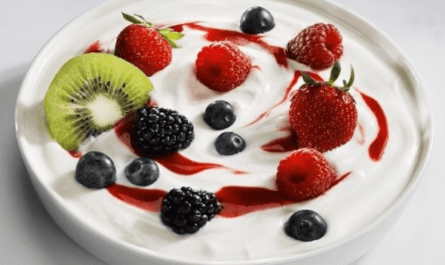Coconut oil is a versatile and natural product that has recently gained immense popularity. Its unique properties make it useful in various applications, from cooking to skincare. In this article, we will explore 20 amazing health benefits and uses of coconut oil.
What is Coconut Oil?
Coconut oil is a natural oil derived from mature coconut meat (or kernel). It is extracted by pressing or crushing the coconut flesh to obtain the oil.
Coconut oil has a unique composition, primarily consisting of saturated fats, with a high concentration of medium-chain fatty acids (MCFAs).
These MCFAs, such as lauric acid, caprylic acid, and capric acid, contribute to coconut oil’s distinctive properties and health benefits.

20 Health Benefits and Uses of Coconut Oil
1. Cooking with Coconut Oil
Coconut oil is a fantastic alternative to traditional cooking oils. Its high smoke point makes it ideal for frying, sautéing, and baking.
Additionally, coconut oil imparts a delightful tropical flavor to dishes, adding a touch of richness and depth. Whether you’re making stir-fries, pancakes, or even desserts, coconut oil can take your culinary creations to a whole new level.
2. Moisturizing Your Skin
One of the most well-known uses of coconut oil is as a moisturizer for the skin. It’s rich texture and nourishing properties help hydrate and soften dry skin, leaving it smooth and supple.
Simply apply a small amount of coconut oil to your skin after showering or bathing, and enjoy its moisturizing benefits.
3. Conditioning Your Hair

Say goodbye to dry and damaged hair by incorporating coconut oil into your hair care routine. This natural oil can penetrate the hair shaft, providing deep conditioning and restoring vitality to your locks.
Apply a generous amount of coconut oil to your hair, focusing on the ends, and leave it in for a few hours or overnight before washing it out. Your hair will thank you for the extra love and care.
4. Oil Pulling for Oral Health
Oil pulling is an ancient Ayurvedic practice that involves swishing oil in your mouth to improve oral health. Coconut oil is an excellent choice for oil pulling due to its antibacterial properties.
Swish a tablespoon of coconut oil in your mouth for about 15 minutes, then spit it out. This practice can help reduce plaque, fight bad breath, and promote overall oral hygiene.
5. Removing Makeup
Coconut oil is a gentle and effective makeup remover. Its oil-based nature helps to dissolve even the most stubborn waterproof makeup, leaving your skin clean and refreshed.
Apply a small amount of coconut oil to a cotton pad and gently wipe away your makeup. Rinse off any residue with water, and voila! You have a natural and affordable makeup remover at your disposal.
6. Soothing Sunburns
If you’ve spent too much time in the sun and ended up with a sunburn, coconut oil can come to the rescue. Its cooling and moisturizing properties can help soothe the skin and reduce redness and inflammation. Apply a thin layer of coconut oil to the affected areas for relief and healing.
7. Boosting Your Smoothies
Give your smoothies a nutritional boost by adding a spoonful of coconut oil. It enhances the flavor and provides a dose of healthy fats and medium-chain triglycerides (MCTs), which can boost energy and promote weight loss. Blend it with your favorite fruits and veggies for a creamy and nutritious treat.
8. Polishing Wood Surfaces
Coconut oil can work wonders when polishing and conditioning wood surfaces. Whether it’s your furniture, cutting board, or wooden utensils, a small amount of coconut oil can help restore their natural luster and prevent cracking.
Apply a thin layer of oil, let it sit for a few minutes, then buff it with a clean cloth. Your wood will look revitalized and beautiful.
9. Treating Dry Feet

Cracked heels and dry feet can be uncomfortable and unsightly. Thankfully, coconut oil can help soften and moisturize rough skin, making your feet feel pampered and smooth.
Before bedtime, apply a generous amount of coconut oil to your feet, wear socks, and let the oil work its magic overnight. Wake up to baby-soft feet the next morning.
10. Boosting Your Coffee
If you’re a coffee lover, why not give it a delicious twist by adding coconut oil? Known as “bulletproof coffee,” this concoction combines coffee, coconut oil, and grass-fed butter for a creamy and energizing beverage.
The healthy fats in coconut oil can provide sustained energy and mental clarity, making it a perfect way to start your day.
11. Treating Chapped Lips
Dry and chapped lips can be uncomfortable and unsightly. Coconut oil is an excellent natural lip balm, keeping your lips soft, moisturized, and protected.
Apply a small amount of coconut oil to your lips throughout the day, especially during dry and cold weather, to keep them kissably smooth.
12. DIY Lip Scrub
In addition to moisturizing your lips, coconut oil can also be used to create a homemade lip scrub.
Mix a teaspoon of coconut oil with brown sugar or coffee grounds to create a gentle exfoliating scrub. Gently massage the mixture onto your lips in circular motions, then rinse with warm water. Your lips will be left feeling rejuvenated and refreshed.
13. Enhancing Your Bath
Transform your bath into a luxurious and relaxing experience by adding coconut oil. As the warm water melts the oil, it releases its moisturizing properties, leaving your skin feeling silky and nourished. You can also add a few drops of your favorite essential oil for an aromatic and soothing bath.
14. Preventing Stretch Marks

During pregnancy or periods of weight gain, stretch marks can appear on the skin. Coconut oil can be a helpful ally in preventing and minimizing the appearance of stretch marks.
Its moisturizing and antioxidant properties can promote skin elasticity and reduce the likelihood of stretch marks forming. Massage coconut oil onto the areas prone to stretch marks regularly to keep your skin supple and smooth.
15. Cleaning Your Makeup Brushes
Regularly cleaning your makeup brushes is essential for maintaining healthy and clear skin. Coconut oil can be used as a natural brush cleanser, effectively removing makeup residue and bacteria.
Mix equal parts of coconut oil and antibacterial dish soap, then swirl your brushes in the mixture. Rinse thoroughly with warm water, reshape the bristles, and let them air dry. Your brushes will be clean, soft, and ready to use.
16. Treating Diaper Rash
Coconut oil is a gentle and natural remedy for treating diaper rash in babies. Its antimicrobial and anti-inflammatory properties can help soothe irritated skin and promote healing.
Clean the affected area, pat it dry, and apply a thin layer of coconut oil to create a protective barrier. Not only will it relieve discomfort, but it will also keep your baby’s skin moisturized.
17. DIY Body Scrub
Create your invigorating body scrub using coconut oil. Mix equal parts of coconut oil, granulated sugar, or sea salt to create a fragrant and exfoliating scrub.
Gently massage the mixture onto your skin in circular motions, then rinse with warm water. Your skin will feel refreshed, renewed, and irresistibly smooth.
18. Removing Gum from Hair
Getting gum stuck in your hair can be a nightmare, but coconut oil can come to the rescue. Apply a generous amount of coconut oil to the gum and surrounding hair, allowing it to lubricate the area.
After a few minutes, gently work the gum out of the hair using your fingers or a comb. The coconut oil will help dissolve the gum and make removing it easier without causing damage.
19. Conditioning Leather Goods
Leather items such as shoes, bags, and belts require regular conditioning to maintain suppleness and prevent cracking. Coconut oil can serve as a natural and effective leather conditioner.
Apply a small amount of coconut oil to a clean cloth and gently rub it into the leather surface. Let it absorb for a few minutes, then buff it with a dry cloth. Your leather goods will look polished and well-maintained.
20. Natural Shaving Cream
Say goodbye to chemical-laden shaving creams and embrace the natural alternative—coconut oil. Its moisturizing and lubricating properties make it an excellent substitute for shaving cream.
Apply a thin layer of coconut oil to your skin before shaving to ensure a smooth and close shave. Your skin will feel nourished and hydrated, and you’ll say hello to silky-smooth legs.
FAQs
1. Can coconut oil be used as a sunscreen?
While coconut oil has a natural SPF of about 4-6, it is insufficient for adequate sun protection. It can be used as a moisturizer or to soothe sunburns, but for effective sun protection, it’s recommended to use a broad-spectrum sunscreen with a higher SPF.
2. Is coconut oil suitable for all skin types?
Coconut oil is generally well-tolerated by most skin types. However, individuals with oily or acne-prone skin may find that coconut oil can clog pores and lead to breakouts. It’s best to patch-test coconut oil on a small skin area before applying it liberally.
3. Can coconut oil help with weight loss?
Coconut oil contains medium-chain triglycerides (MCTs), metabolized differently by the body than other fats. Some studies suggest that MCTs can increase feelings of fullness and boost calorie expenditure, potentially aiding in weight loss. However, consuming coconut oil in moderation is important as part of a balanced diet.
4. Can coconut oil be used on pets?
Yes, coconut oil can be used on pets for various purposes. It can help moisturize dry skin, soothe itchiness, and promote a healthy coat. However, consulting with a veterinarian before using coconut oil on your pets is essential to ensure it’s safe and appropriate for their specific needs.






